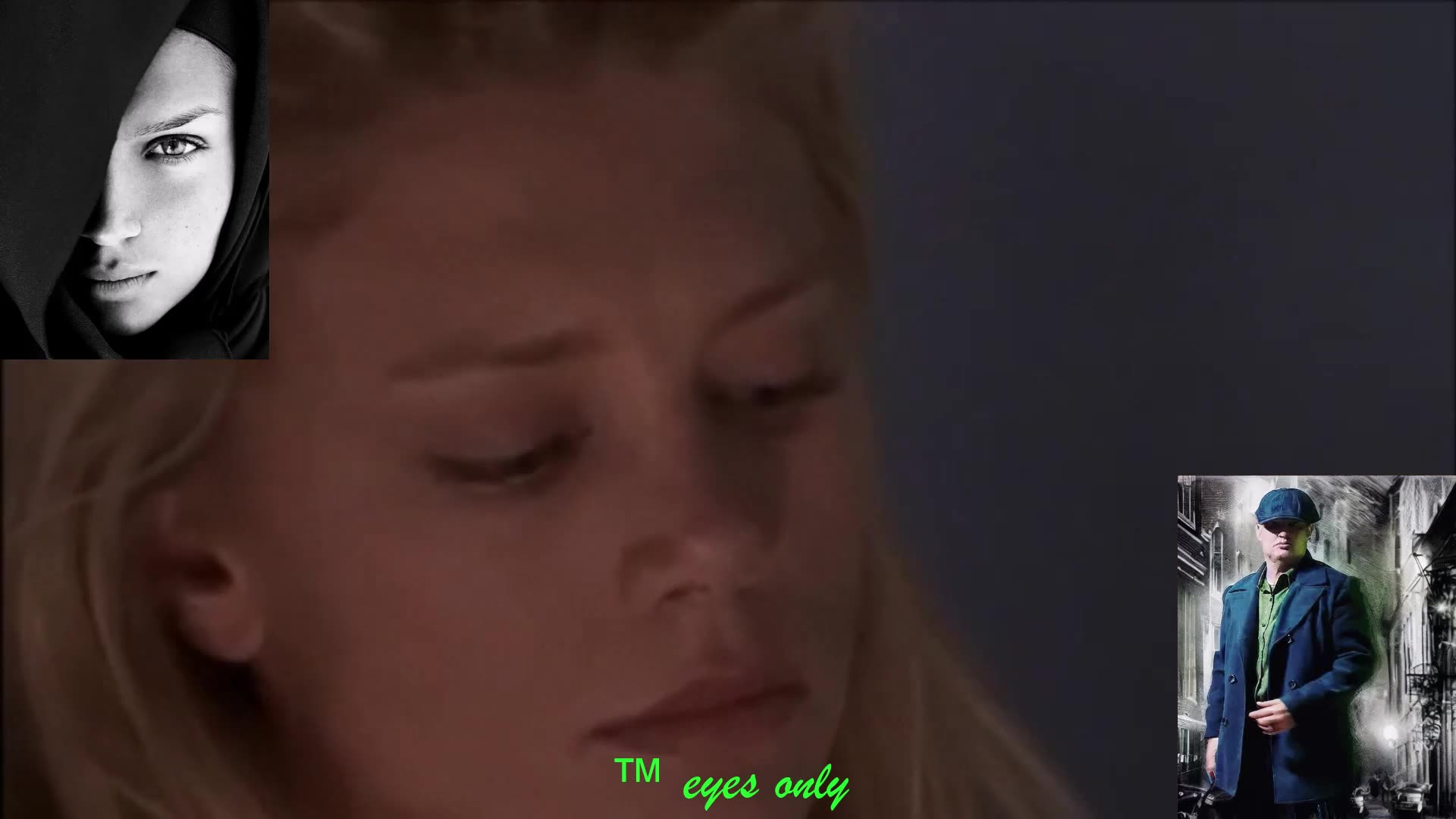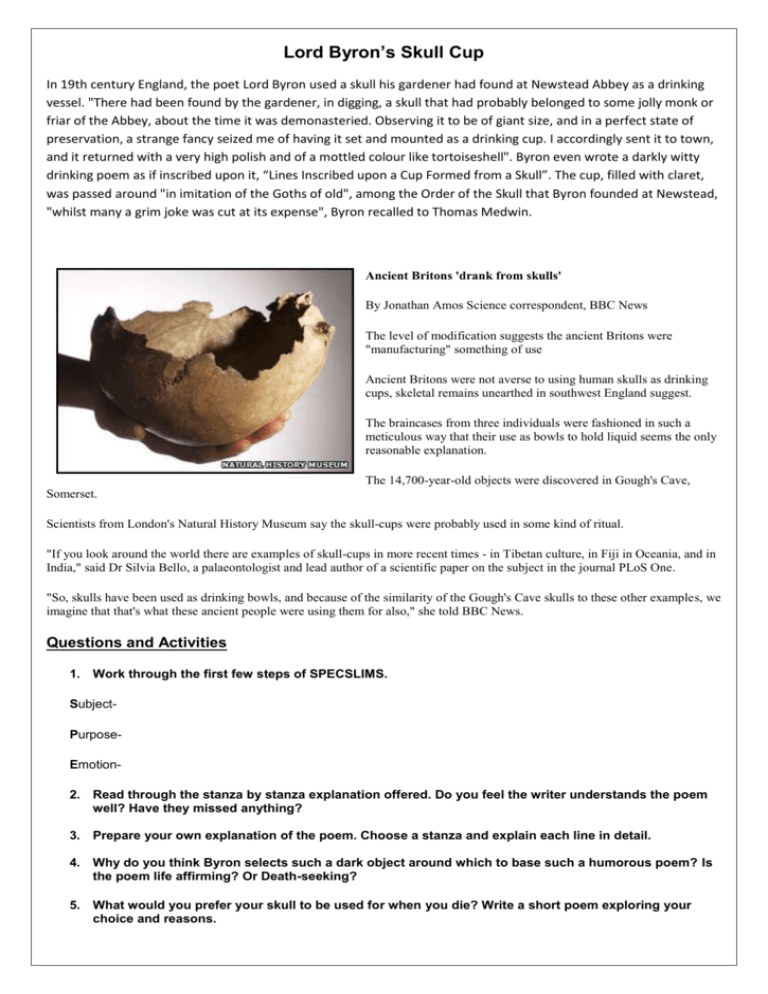
Poetry Lord Byron Lines Inscribed Upon A Cup Formed From A Skull YouTube
Lines Inscribed Upon a Cup Formed From a Skull is a thought-provoking poem written by Lord Byron, one of the most influential poets of the Romantic era. This article aims to provide a detailed analysis of the poem, exploring its themes, structure, literary devices, and historical context.

Ancient Britons Used Skulls as Cups Science AAAS
Analysis of Lines Inscribed Upon a Cup Formed from a Skull George Gordon Byron 1788 - 1824 Death Life Love Nature Start not—nor deem my spirit fled: A In me behold the only skull B From which, unlike a living head, A Whatever flows is never dull. B I lived, I loved, I quaff'd, like thee: C I died: let earth my bones resign; D

need these for my green tea Diy skulls, Tea cups, Skull decor
A-level students explore the speaker's voice, key concepts and the context of Byron's poem, 'Lines Inscribed Upon a Cup Formed from a Skull'. There is also a textual annotation activity which encourages close analysis of the entire poem.

skull and cross utensils teacup. 16.00, via Etsy. Coffee Tea, Coffee Cups, Tea Cups, White
'Lines Inscribed Upon a Cup Formed From a Skull' was written in 1808. It is part of Lord Byron's early poetry. He was only 19 years old when he wrote this poem, where he expresses his disdainful thoughts surrounding death. The poem has six quatrains with an ABAB rhyme scheme.

Human skulls modified into 'cups', according to A. de Maret and H.... Download Scientific Diagram
The worm hath fouler lips than thine. Better to hold the sparkling grape, Than nurse the earth-worm's slimy. brood; And circle in the goblet's shape. The drink of gods, than reptile's food. Where once my wit, perchance, hath shone, In aid of others' let me shine; And when, alas! our brains are gone,

Byron Poems Print Pack Lines Inscribed Upon a Cup Formed from a Skull Lord Byron Start not—nor
Lines Inscribed Upon a Cup Formed from a Skull George Gordon Byron 1788 - 1824 Start not—nor deem my spirit fled: In me behold the only skull From which, unlike a living head, Whatever flows is never dull. I lived, I loved, I quaff'd, like thee: I died: let earth my bones resign; Fill up—thou canst not injure me;

Poesia Lord Byron Lines Inscribed Upon A Cup Formed From A Skull
A skull cup is a drinking vessel or eating bowl made from an inverted human calvaria that has been cut away from the rest of the skull.

Lord Byron Lines Inscribed Upon a Cup Formed From a Skull Analysis YouTube
In me behold the only skull From which, unlike a living head, Whatever flows is never dull. I lived, I loved, I quaffed like thee; I died: let earth my bones resign: Fill up—thou canst not injure me; The worm hath fouler lips than thine. Better to hold the sparkling grape Than nurse the earthworm's slimy brood, And circle in the goblet's.

Our cannibal ancestors used human skulls as drinking cups after eating their owners Mirror Online
Ravi Shankar (Haiku Erasure of Lord Byron's "Lines Inscribed Upon a Cup Formed from a Skull") Start spirit; behold the skull. A living head loved earth. My bones resign the worm, lips to hold sparkling grape's slimy circle, shape of reptile's food. Where wit shone of shine, when our brains are substitute, like me, with the dead,

Lines Inscribed Upon A Cup Formed From A Skull piano tutorial
Back to Poems Page. Lines Inscribed Upon A Cup Formed From A Skull by Lord Byron. Start not—nor deem my spirit fled: In me behold the only skull. From which, unlike a living head, Whatever flows is never dull. I lived, I loved, I quaffed like thee; I died: let earth my bones resign: Fill up—thou canst not injure me;

Lord Byron Lines Inscribit Upon a Cup Formt fae a Skull YouTube
Terms in this set (10) Structure of the Poem. The poem is made of six quatrains of alternating rhyme (ABAB) in iambic tetrameter. "Start not --". The CAESURA that follows allows the reader to pause. Given the title of the poem and the introductory words, the reader can prepare for something sinister or Gothic. "In me behold the only skull".

Gordon Byron Lines Inscribed upon a Cup Formed from a Skull YouTube
Extra Info: Newstead Abbey, 1808. [First published in the seventh edition of 'Childe Harold'.] 1: Byron gave Medwin the following account of this cup: - "The gardener in digging [discovered] a skull that had probably belonged to some jolly friar or monk of the abbey, about the time it was dis-monasteried.

Inscribed cup, early The History of Egypt Podcast
Analysis of context, form and language for Lord Byron's poem 'Lines Inscribed Upon a Cup Formed From a Skull'. This is a prescribed poem in the Romantic poet.

Lines Engraved on a skull cup
Early Poems: Lines Inscribed Upon a Cup Formed From a Skull. 1. Start not - nor deem my spirit fled: In me behold the only skull, From which, unlike a living head, Whatever flows is never dull. 2. I lived, I loved, I quaff'd, like thee: I died: let earth my bones resign;

Lines Inscribed Upon A Cup Formed From A Skull by ted4everart on DeviantArt
Byron - 'Lines Inscribed upon a Cup Formed from a Skull' (1808) 5.0 (1 review) Flashcards; Learn; Test; Match; Q-Chat;. caesura fragments the line and emphasizes the unexpectedness of the skull speaking which makes the listener 'start' or jump.-play on words through the ambiguity of the word 'spirit' (the soul/ alcohol) helps to establish a.

Lines Inscribed Upon A Cup Formed From A Skull Poem by Gordon Byron Poem Hunter
Start not—nor deem my spirit fled: In me behold the only skull. From which, unlike a living head, Whatever flows is never dull. I lived, I loved, I quaffed like thee; I died: let earth my bones resign: Fill up—thou canst not injure me; The worm hath fouler lips than thine. Better to hold the sparkling grape.
